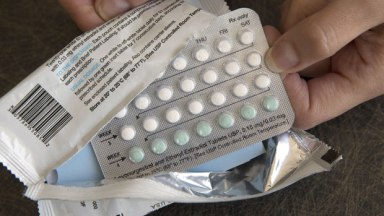
In a perfect world, a female can just walk into her gynecologist’s office and miraculously be matched with a birth control that is compatible with her body, right? However, as you may know, this world is far from perfect. But, we’ll keep dreaming. When it comes to choosing the right birth control, it’s not a one-size-fits-all game; it’s almost a trial and error game to see which contraceptive works for you. And, nowadays, there’s not only the pill; there’s also IUDs, and the shot; which are explained, below. Other forms include the ring, condoms and the implant.
To make sure we steered you in the right direction, HollywoodLife.com called on New York Gynecologist, MD, Alyssa Dweck to fill us in on everything you should know when it’s time to choose a contraceptive. Dweck also talked about birth control and its relation to breakouts and weight gain. [If you want to know more about women’s health, check out her newest book, The Complete A to Z for Your V.]
How can girls find the right birth control for them — “There are lots of individual nuances that come into play when we choose birth control,” Dweck began. “There’s birth control pills, IUDs and the shot, to name a few.” While birth control pills have been around since 1960, the other forms of contraceptives are newer options. An IUD [intra-uterine device] is a T-shaped piece of plastic that is inserted into the uterus to provide birth control. With the IUD, there are multiple different types, all of which have different side effects and ways of working; some contain the hormone progesterone and one contains copper and is non-hormonal. The shot is a hormonal injection that provides birth control.
The pill — “If women are suffering from irregular periods, ache, or terrible cramps, then they may be able to kill a couple birds with one stone by using birth control pills,” Dweck said, adding that “the pill is really good for controlling all of those symptoms.” A visit to your gynecologist will help to sort out which pill will work best with your body, based on your symptoms and medical history.
IUDs — In the short, IUDs are popular for convenience and long acting but reversible contraception. “There are many different kinds of IUDs that work wonderfully,” Dweck said. “And, IUDs are reversible [so fertility returns to baseline as soon as they are removed]. “IUDs are also very good for birth control, because you don’t have to remember to take them every day. Therefore, there is less error with IUDs. Depending on when they are inserted during the menstrual cycle, IUDs may even be effective immediately after insertion.”
But, there’s a few things about IUDs, women need to be educated about. “Hormonal IUDs will most likely cause irregular cycles temporarily; so, for someone who favors regularity and a consistent cycle, this may not be for them,” Dweck admitted. “The hormonal IUD may not take as well to some women; everyone is different. But, there are also non-hormonal IUDs. I would recommend this copper [non-hormonal] IUD, for those who don’t like or can’t take hormones,” she advised.
The shot — The shot is tricky, in terms of pros and cons. Women who choose to receive the shot, must see their doctor every three months to be injected; Now, some people see that as convenient, since you only have to think about birth control 4 times per year. However, some people see that as an inconvenience, because you actually have to visit the doctor four times on a time table of three months to receive birth control. Another pro, is that the shot is considered extremely effective at preventing pregnancy, in most cases.
Nonetheless, side effects from the shot tend to be more harsh than other forms of contraceptives, with the most common being weight gain. “One birth control we know people will likely gain weight on, is the shot,” Dweck revealed. “The Depo-Provera shot, you can count on gaining a few pounds. It’s not clear why, but it may have to do with water retention. The shot just seems to have that as a very standard symptom.”
Can birth control pills make women break out? — “There are different varieties of birth control pills in terms of their ingredients, although most of them work in the same way,” Dweck said. “Most birth control pills actually lower the amount of testosterone that is circulating in the blood. And, since acne gets worse when your testosterone level is high, we often treat acne with birth control pills. I would say for the most part, the pill is a beneficial thing for acne and not negative.”
Birth control and weight gain: Are they related? — While most women have nothing to worry about when it comes to birth control and weight gain, there are certain situations where the scale may rise after the start of birth control. Click here to read more about Dweck’s explanation of birth control and weight gain.
HollywoodLifers, if you care to share, tell us your thoughts about contraceptives.